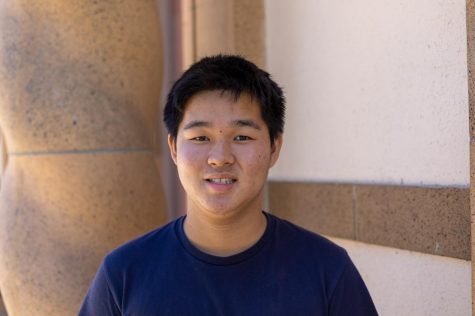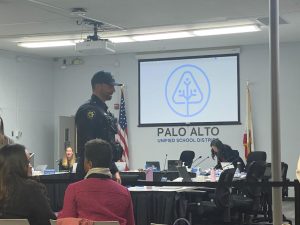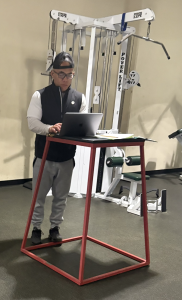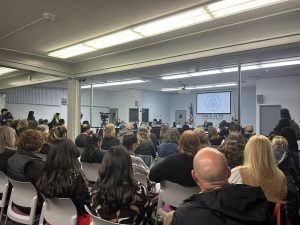Muwekma Ohlone leader promotes federal recognition
Muwekma Ohlone Chairwoman Charlene Nijmeh speaks to students during sixth period in Palo Alto High School’s Performing Arts Center on her initiative to get federal re-recognition. According to Nijmeh, the tribe’s efforts thus far have not been well received by government officials. “Politicians are creating this system where we [the Muwekma and other tribes] are pitted against each other for economic development,” Nijmeh said.
April 15, 2023
Students gathered in the Palo Alto High School Performing Arts Center today to hear Muwekma Ohlone Chairwoman Charlene Nijmeh speak on her goal of regaining federal recognition of the Muwekma tribe.
According to Nijmeh, the Muwekma tribe settled the land with the San Francisco Bay Area for over 10,000 years and was promised land and recognition by the federal government. However, Nijmeh said that due to a mistake in record-keeping and the discovery of gold in California, the Muwekma were displaced from their lands and lost the federal recognition given to them by Congress.
Nijmeh was invited to Paly to speak by students from the Social Justice Pathway after she recently led a delegation to Washington D.C. — including four SJP students — to raise awareness of the Muwekma and their fight for federal recognition.
Junior Athya Paramesh was one of the students on the delegation and witnessed Nijmeh’s advocacy first-hand in various meetings with representatives and senators.
“The four of us were so inspired after seeing Charlene speak up in those meetings and defend her people and advocate for federal recognition,” Paramesh said. “In order to get the community on the same page we figured we could do a presentation. But then we realized it would be so much more powerful coming from the chairwoman herself.”
Nijmeh began by greeting the audience in her native tongue, followed by a personal anecdote on how her family was forcefully removed from their home during her youth, an experience familiar to many Muwekma tribal members.
“For over a century it was the colonizers who enslaved us, raped us, and stole our children,” Nijmeh said. “It was the colonizers who robbed us of our lands and our possessions. They were the ones who hunted us and killed us because we lived on land that was too valuable to leave to the Indians.”
According to Nijmeh, her ancestors survived these injustices, but it is her responsibility to continue their fight.
“All of us survived a century of injustice,” Nijmeh said. “Today we still live with colonialist and racist mindsets that want to dictate how we live on our lands and what decisions we make for our own people.”
According to Nijmeh, many major tech companies, who have made Silicon Valley their home, occupy Muwekma land and have made no effort to recognize the previous Muwekma owners.
“These companies that generate immense wealth while occupying stolen, unseeded, molecular lands, never asked the question ‘What happened to the Ohlone Indians?’,” Nijmeh said. “They don’t ask that question because if they did, they would have to justify their role in our political erasure and gentrification.”
Nijmeh said she hopes to regain federal recognition of her tribe, but that her tribe still exists without recognition.
“Just to be clear, federal recognition does not create tribes, it recognizes the social-political communities that pre-date the United States,” Nijmeh said. “It creates a trusting relationship between the tribe and the federal government.”
According to Nijmeh, the main motivation of the Muwekma for federal recognition is recovering the tribe’s ancestors, many of which remain under institutions such as the University of California, Berkeley.
“The University of Berkeley is holding 12,000 of our ancestors,” Nijmeh said. “Because we aren’t federally recognized, we can’t repatriate our ancestors back to the ground and give them peace.”
According to Nijmeh, three other Californian tribes have been federally recognized by an official letter from Congress, however, the Muwekma tribe remains unrecognized. In total, Nijmeh said Congress had reaffirmed 26 tribes since 1970.
“All we [the Muwekma Tribe] were asking for is to have our existence acknowledged that we are still here,” Nijmeh said. “The government simply needs to correct their mistakes and restore our status, either by administrative correction, Congress, or a bill.”
According to Nijmeh, California representatives have offered to give the Muwekma recognition if they relinquish their right to the gaming industry. Nijmeh said that the Muwekma have no current plans to build a Casino, but are unwilling to surrender their right to future generations.
“We would still not have the right to live in freedom, peace and dignity on our own lands,” Nijmeh said. “The right to nation-build rather than be dependent on the federal government for handouts.”
Nijmeh said students and other Palo Alto community members can help her tribe receive government recognition by using their voices to speak out for the Muwekma within their own community.
“Your voice matters, help amplify our voices out in your community,” Nijmeh said. “Right now they [Congress] are ignoring us, and ignoring you guys too.”
The SJP students will be hosting an event at 1 p.m. on Sunday in the Media Arts Center next where all students can come and write letters on behalf of the Muwekma Tribe to Congress, advocating for their need for federal recognition.


![Muwekma Ohlone Chairwoman Charlene Nijmeh speaks to students during sixth period in Palo Alto High School's Performing Arts Center on her initiative to get federal re-recognition. According to Nijmeh, the tribe's efforts thus far have not been well received by government officials. “Politicians are creating this system where we [the Muwekma and other tribes] are pitted against each other for economic development," Nijmeh said.](https://palyvoice.com/wp-content/uploads/2023/04/364A9648-e1681541446312-900x645.jpg)








